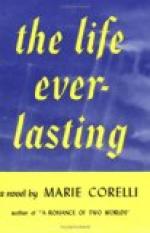That night we were a curious party at dinner. Never were five human beings more oddly brought into contact and conversation with each other. We were absolutely opposed at all points; in thought, in feeling and in sentiment, I could not help remembering the wonderful network of shining lines I had seen in that first dream of mine,— lines which were apparently mathematically designed to meet in reciprocal unity. The lines on this occasion between us five human beings were an almost visible tangle. I found my best refuge in silence,—and I listened in vague wonderment to the flow of senseless small talk poured out by Dr. Brayle, apparently for the amusement of Catherine, who on her part seemed suddenly possessed by a spirit of wilfulness and enforced gaiety which moved her to utter a great many foolish things, things which she evidently imagined were clever. There is nothing perhaps more embarrassing than to hear a woman of mature years giving herself away by the childish vapidness of her talk, and exhibiting not only a lack of mental poise, but also utter tactlessness. However, Catherine rattled on, and Dr. Brayle rattled with her,—Mr. Harland threw in occasional monosyllables, but for the most part was evidently caught in a kind of dusty spider’s web of thought, and I spoke not at all unless spoken to. Presently I met Catherine’s eyes fixed upon me with a sort of round, half-malicious curiosity.
“I think your day’s outing has done you good,” she said—“You look wonderfully well!”
“I am well!” I answered her—“I have been well all the time.”
“Yes, but you haven’t looked as you look to-night,” she said—“You have quite a transformed air!”
“Transformed?”—I echoed, smiling—“In what way?”
Mr. Harland turned and surveyed me critically.
“Upon my word, I think Catherine is right!” he said—“There is something different about you, though I cannot explain what it is!”
I felt the colour rising hotly to my face, but I endeavoured to appear unconcerned.
“You look,” said Dr. Brayle, with a quick glance from his narrowly set eyes—“as if you had been through a happy experience.”
“Perhaps I have!” I answered quietly—“It has certainly been a very happy day!” “What is your opinion of Santoris?” asked Mr. Harland, suddenly—“You’ve spent a couple of hours alone in his company,—you must have formed some idea.”
I replied at once, without taking thought.
“I think him quite an exceptional man,” I said—“Good and great-hearted,—and I fancy he must have gone through much difficult experience to make him what he is.”
“I entirely disagree with you,”—said Dr. Brayle, quickly—“I’ve taken his measure, and I think it’s a fairly correct one. I believe him to be a very clever and subtle charlatan, who affects a certain profound mysticism in order to give himself undue importance—”
There was a sudden clash. Mr. Harland had brought his clenched fist down upon the table with a force that made the glasses ring.




